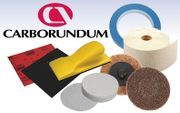Carborundum
Description
[Carborundum] Originally a registered trademark that is now used for several artificial abrasives made from Silicon carbide, fused Alumina, and other materials. Edward Atcheson accidentally made Carborundum in 1884 when he was attempting to synthesize diamonds from Clay and Coke. He patented the material in 1893 and trademarked it under the name Carborundum, a variant of Corundum, because he incorrectly believed his compound contained Carbon and Aluminum oxide. His product was, however, was composed of silicon carbide which has a Mohs' hardness scale of 9.17. Now many varieties of Carborundum are available with varying hardness and grit. Carborundum abrasives are used for cutting, grinding and polishing all kinds of metal and glass.
Synonyms and Related Terms
silicon carbide
Risks
- No significant health hazard.
- May produce a hazy glaze if residues are left on biscuit.
- ThermoFisher: SDS
Comparisons
Properties of Common Abrasives
Physical and Chemical Properties
- Saint-Gobain Abrasives: Carborundum
- Ralph Mayer, A Dictionary of Art Terms and Techniques, Harper and Row Publishers, New York, 1969 (also 1945 printing)
- Michael McCann, Artist Beware, Watson-Guptill Publications, New York City, 1979
- Robert Fournier, Illustrated Dictionary of Practical Pottery, Chilton Book Company, Radnor, PA, 1992
- Encyclopedia Britannica, http://www.britannica.com Comment: "silicon carbide" [Accessed July 26, 2002].
- George Savage, Art and Antique Restorer's Handbook, Rockliff Publishing Corp, London, 1954
- G.S.Brady, Materials Handbook, McGraw-Hill Book Co., New York, 1971 Comment: p. 714
- Richard S. Lewis, Hawley's Condensed Chemical Dictionary, Van Nostrand Reinhold, New York, 10th ed., 1993
- Random House, Webster's Encyclopedic Unabridged Dictionary of the English Language, Grammercy Book, New York, 1997
- The American Heritage Dictionary or Encarta, via Microsoft Bookshelf 98, Microsoft Corp., 1998
- Art and Architecture Thesaurus Online, https://www.getty.edu/research/tools/vocabulary/aat/, J. Paul Getty Trust, Los Angeles, 2000 Comment: Carborundum (TM)
